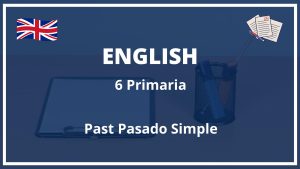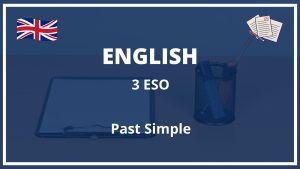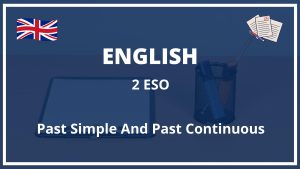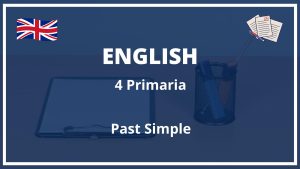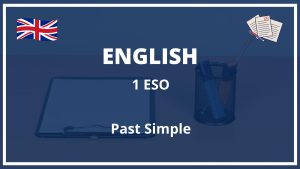
Abrir Ejercicios Past Simple 4 ESO | Exercices
El past simple en inglés es una de las formas verbales más utilizadas, ya que se trata del tiempo verbal que se emplea para hablar de acciones o sucesos que ocurrieron en un momento concreto del pasado y que ya han terminado.
Para conjugar un verbo en past simple en inglés, lo único que necesitas hacer es añadir la terminación -ed al infinitivo del verbo. Sin embargo, hay que tener en cuenta que hay algunos verbos que, al añadir esta terminación, cambian de forma radical, como por ejemplo write (escribir) que se convierte en wrote (escribió) o read (leer) que pasa a ser read (leyó).
En estos casos, lo mejor es acudir a un diccionario o a una gramática de inglés para buscar la forma correcta del verbo en past simple. No obstante, a continuación te ofrecemos una lista de los verbos más utilizados en past simple en inglés, así como su traducción al español.
Lista de verbos en past simple en inglés
Aquí tienes una lista de los verbos más utilizados en past simple en inglés, así como su traducción al español:
- be (ser, estar): I was (fui), you were (fuiste), he/she/it was (fue), we were (fuimos), you were (fuisteis), they were (fueron).
- become (convertirse): I became (me convertí), you became (te convertiste), he/she/it became (se convirtió), we became (nos convertimos), you became (os convertisteis), they became (se convirtieron).
- begin (empezar): I began (empecé), you began (empezaste), he/she/it began (empezó), we began (empezamos), you began (empezasteis), they began (empezaron).
- bring (traer): I brought (traje), you brought (trajiste), he/she/it brought (trajo), we brought (trajimos), you brought (trajisteis), they brought (trajeron).
- build (construir): I built (construí), you built (construiste), he/she/it built (construyó), we built (construimos), you built (construisteis), they built (construyeron).
- buy (comprar): I bought (compré), you bought (compraste), he/she/it bought (compró), we bought (compramos), you bought (comprasteis), they bought (compraron).
- choose (elegir): I chose (elegí), you chose (elegiste), he/she/it chose (elegió), we chose (elegimos), you chose (elegisteis), they chose (elegir).
- come (venir): I came (vine), you came (viniste), he/she/it came (vino), we came (vinimos), you came (vinisteis), they came (vinieron).
- cost (costar): I cost (costé), you cost (costaste), he/she/it cost (costó), we cost (costamos), you cost (costasteis), they cost (costaron).
- cut (cortar): I cut (corté), you cut (cortaste), he/she/it cut (cortó), we cut (cortamos), you cut (cortasteis), they cut (cortaron).
- do (hacer): I did (hice), you did (hiciste), he/she/it did (hizo), we did (hicimos), you did (hicisteis), they did (hicieron).
- draw (dibujar): I drew (dibujé), you drew (dibujaste), he/she/it drew (dibujó), we drew (dibujamos), you drew (dibujasteis), they drew (dibujaron).
- drink (beber): I drank (bebí), you drank (bebiste), he/she/it drank (bebió), we drank (bebimos), you drank (bebisteis), they drank (bebieron).
- drive (conducir): I drove (conduje), you drove (condujiste), he/she/it drove (condujo), we drove (condujimos), you drove (condujisteis), they drove (condujeron).
- eat (comer): I ate (comí), you ate (comiste), he/she/it ate (comió), we ate (comimos), you ate (comisteis), they ate (comieron).
- fall (caer): I fell (caí), you fell (caíste), he/she/it fell (cayó), we fell (caímos), you fell (caísteis), they fell (cayeron).
- feed (alimentar): I fed (alimenté), you fed (alimentaste), he/she/it fed (alimentó), we fed (alimentamos), you fed (alimentasteis), they fed (alimentaron).
- feel (sentir): I felt (sentí), you felt (sentiste), he/she/it felt (sintió), we felt (sentimos), you felt (sentisteis), they felt (sintieron).
- fight (pelear): I fought (peleé), you fought (peleaste), he/she/it fought (peleó), we fought (peleamos), you fought (peleasteis), they fought (pelearon).
- find (encontrar): I found (encontré), you found (encontraste), he/she/it found (encontró), we found (encontramos), you found (encontrasteis), they found (encontraron).
- fly (volar): I flew (volé), you flew (volaste), he/she/it flew (voló), we flew (volamos), you flew (volasteis), they flew (volaron).
- forbid (prohibir): I forbade (prohibí), you forbade (prohibiste), he/she/it forbade (prohibió), we forbade (prohibimos), you forbade (prohibisteis), they forbade (prohibieron).
- forget (olvidar): I forgot (olvidé), you forgot (olvidaste), he/she/it forgot (olvidó), we forgot (olvidamos), you forgot (olvidasteis), they forgot (olvidaron).
- forgive (perdonar): I forgave (perdoné), you forgave (perdonaste), he/she/it forgave (perdonó), we forgave (perdonamos), you forgave (perdonasteis), they forgave (perdonaron).
- freeze (congelar): I froze (congelé), you froze (congelaste), he/she/it froze (congeló), we froze (congelamos), you froze (congelasteis), they froze (congelaron).
- get (obtener): I got (obtuve), you got (obtuviste), he/she/it got (obtuvo), we got (obtuvimos), you got (obtuvisteis), they got (obtuvieron).
- give (dar): I gave (di), you gave (diste), he/she/it gave (dio), we gave (dimos), you gave (disteis), they gave (dieron).
- go (ir): I went (fui), you went (fuiste), he/she/it went (fue), we went (fuimos), you went (fuisteis), they went (fueron).
- grow (crecer): I grew (crecí), you grew (creciste), he/she/it grew (creció), we grew (crecimos), you grew (crecisteis), they grew (crecieron).
- hang (colgar): I hung (colgué), you hung (colgaste), he/she/it hung (colgó), we hung (colgamos), you hung (colgasteis), they hung (colgaron).
- Ejercicios Resueltos Past Simple Ingles 4 Eso
Ejercicios Resueltos Past Simple Ingles 4 Eso
1. Put the verbs into the correct form (simple past).
a. We (meet) our new teacher yesterday.
b. They (arrive) at two o’clock.
c. I (watch) TV all evening.
d. We (have) a wonderful time.
e. He (be) very tired when he got home.
f. She (read) a lot of books last week.
g. They (go) out for a meal on Saturday.
h. I (meet) my friends in town yesterday.
i. We (visit) our grandparents last weekend.
j. I (cook) dinner for my family on Sunday.2. Complete the sentences with the simple past of the verbs in brackets.
a. I (meet) John in town yesterday.
b. They (arrive) at two o’clock.
c. I (watch) TV all evening.
d. We (have) a wonderful time.
e. He (be) very tired when he got home.
f. She (read) a lot of books last week.
g. They (go) out for a meal on Saturday.
h. I (meet) my friends in town yesterday.
i. We (visit) our grandparents last weekend.
j. I (cook) dinner for my family on Sunday.
3. Complete the sentences with one of the verbs in brackets, using the simple past. a. I (meet) John in town yesterday.
b. They (arrive) at two o’clock.
c. I (watch) TV all evening.
d. We (have) a wonderful time.
e. He (be) very tired when he got home.
f. She (read) a lot of books last week.
g. They (go) out for a meal on Saturday.
h. I (meet) my friends in town yesterday.
i. We (visit) our grandparents last weekend.
j. I (cook) dinner for my family on Sunday.
4. Complete the sentences with the simple past of the verbs in brackets. a. I (meet) John in town yesterday.
b. They (arrive) at two o’clock.
c. I (watch) TV all evening.
d. We (have) a wonderful time.
e. He (be) very tired when he got home.
f. She (read) a lot of books last week.
g. They (go) out for a meal on Saturday.
h. I (meet) my friends in town yesterday.
i. We (visit) our grandparents last weekend.
j. I (cook) dinner for my family on Sunday.
